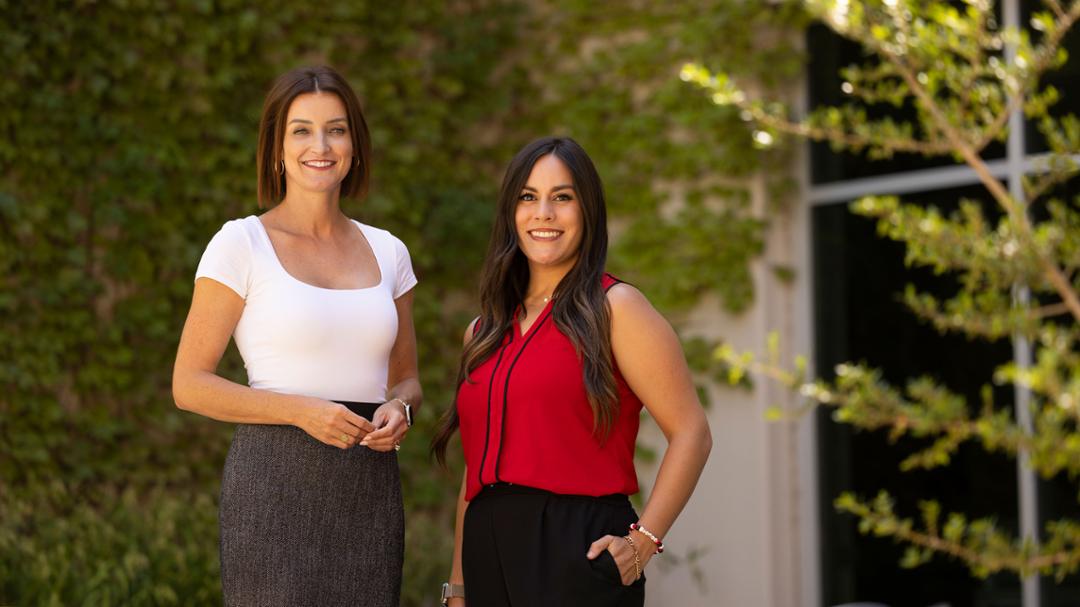The college’s journey of establishing a culture of caring for students culminated with an overhaul of its core curriculum this fall semester.
Fallon Contreras joins Adrienne Carnes in her office in the Jerry S. Rawls College of Business. Along with typical office decor — office plants, family photos, books and various Texas Tech University memorabilia — a massive whiteboard dominates one wall.
On either side of the whiteboard are two running lists: one shows the college’s enrollment numbers for recent years and the other shows the college’s retention rate for the same period.
Every time Carnes enters her office, she looks at these numbers. To her, they are not evidence of what the college has done to recruit and retain students; they are her motivation for doing her work.
It is a topic both Carnes and Contreras are eager to discuss.
“For us, retention is personal,” Carnes says. “Our job is to keep the students here, and if it’s not in this college, it’s somewhere in this university.”
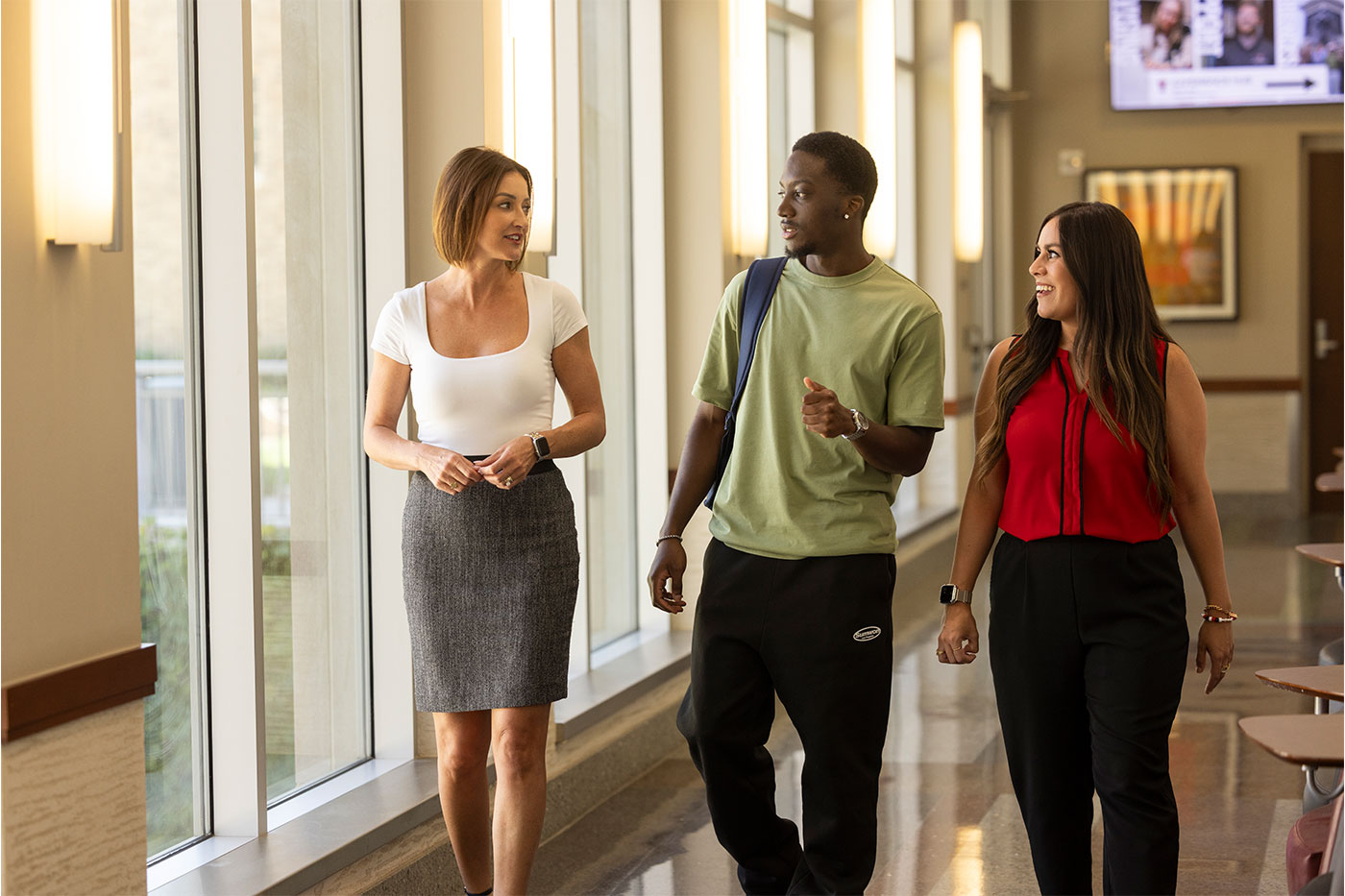
Carnes and Contreras work closely together within the college’s Rawls Experience Hub, which houses an array of undergraduate student services. Carnes is the hub’s senior director, overseeing the entire office to ensure students thrive academically and socially. Contreras is the director of student engagement and recruitment and leads strategic initiatives to attract and retain students.
Their work enables them to be privy to a student’s full Texas Tech story. They meet with prospective students and their families before the student has even officially committed to a school and work with current students right up until commencement.
The entire time, Carnes and Contreras are trying to ensure students succeed while at Rawls College.
This work became especially imperative after the COVID-19 pandemic. According to studies by Inside Higher Ed, students returned to or arrived on campus less engaged with their universities, due in part to the sudden lack of socio-emotional opportunities when schools went remote.
Mitzi Lauderdale, vice provost for Academic Innovation & Student Success (AISS), has seen this issue at Texas Tech.
“Since COVID, our focus has shifted as students' needs have evolved,” Lauderdale said. “Students are looking for more than a place to learn. They want to feel part of something bigger.”
Carnes and Contreras have been at the epicenter of Rawls College’s attempts to create that feeling for their students. They have been cultivating a culture of caring that gives students more opportunities to engage with the college, such as enhanced mental health support and dedicated first-year programming. The college’s efforts in the past five years have culminated in a total overhaul of its business core curriculum, which debuted with the Fall 2025 semester.
Since beginning this culture shift, the college has not only seen the retention rate stabilize after the pandemic but continue to push toward 90%.
This accomplishment, Carnes insists, could only be done with the support of everyone at the college, from students and alumni to staff, faculty and industry partners. It is an effort that extends beyond the work in the Rawls Experience Hub.
And it starts at the top with Dean Margaret Williams.
“With an expected undergraduate enrollment of more than 5,600 students this fall, we realize our students come from all different backgrounds, locations and experiences,” Williams said. “To help each student develop the talents and skills necessary for the workplace, we must meet students where they are and be willing to address a wide range of challenges through the opportunities we provide.”
Caring About Mental Health
When students came back to campus in fall 2020, it did not take long for Carnes to see that her team’s academic advising responsibilities had ballooned.
It was not uncommon for a student to come in for a standard academic advising meeting only for them to break down and start crying over the stress of their life. The academic advisors were often doing double-duty, serving as stand-in mental health counselors.
“We were taking on a lot of the emotional and mental burden that the students were carrying,” Carnes says. “We didn’t have a person in place to fulfill that role, so if a student was struggling with something and the counseling center was booked up, we were the front line.”
In 2022, Carnes began working with the Student Counseling Center (SCC) to bring in Elise McCay as an embedded mental health counselor. McCay would still be primarily employed through SCC but would also have an office to meet with students at Rawls College.
Rawls College students were still encouraged to make appointments and access services through SCC, but having McCay in the building added a new dynamic to the student experience. Now, there were opportunities to discuss their mental health issues or develop coping strategies in the same physical building they associated with working hard.
And while McCay helped relieve some of the burden from advisors, Carnes looked at getting the academic advisors certified in Mental Health First Aid through Texas Tech’s Office for Advising Excellence. She wanted to better equip the academic advisors to continue helping students with their mental health in some capacity.
“The heaviest burden was hearing some really unfortunate circumstances that our students were going through and not having adequate tools to manage or deal with that,” Carnes says. “At that time, we didn’t really know what to do. For us, the certification was something that we needed to better help the students.”
With the mental health needs of Rawls College students addressed, the college turned its attention to first-year students.
Caring About First-Year Students
The first year of college is often the most important for a student. It is a foundation-setting year as students develop independent study strategies, explore college-level topics and forge their identities in new and unfamiliar environments.
Red Raider Orientation (RRO) is one of the first steps all incoming students complete. During the two-day event, students are introduced to academic advisors, support services, Texas Tech traditions and so much more.
Carnes and Contreras saw an opportunity to kickstart student (and even family) engagement and encouraged faculty to participate in the college’s RRO sessions in 2023.
Some faculty were at first hesitant about participating in RRO, but Contreras says it did not take long for them to see the benefit.
“Energy commerce was one of the first areas on board with orientation, and their main incentive was to get in front of more students,” Contreras says. “The other areas saw that, and it’s exactly what they want as well, to get in front of students.”
As of this past summer, all programs within Rawls College sent faculty members to RRO sessions.
Carnes is quick to add that faculty participation at RRO sessions has played a big role in increasing parent and guardian confidence in their student’s choice to attend Texas Tech.
To say there are some nervous or anxious feelings with parents or guardians of traditional first-year students would be an understatement. Their child is out of the home and there is no guarantee they are eating well, studying consistently or generally taking care of themselves.
“We framed it like, ‘This is your opportunity to get in front of parents and really sell your program,’” Carnes says. “The faculty were excited about that. They never really had that opportunity before.”
Since inviting faculty to participate at RRO, Contreras says the feedback has been overwhelmingly positive and students and their families feel more connected to the college.
“Parents and students can see, ‘Oh, that’s going to be my professor in a few semesters,’” Conteras says. “Just having faculty present is a huge thing. The parents enjoy meeting them. The faculty love meeting the parents and seeing their future students.”
Once the academic year begins, Rawls College builds on the engagement momentum from RRO with its First-Year Experience (FYE) program.
Launched in 2023, the FYE program has provided various opportunities for first-year Rawls College students to connect with the college and other business students. The program is run by business administration faculty members Catherine Duran, professor of practice, and Emily Phillips, lecturer. FYE is part of the college’s broader Rawls Student Experience initiative overseen by Contreras.
With first-year students taking required courses across campus, it can be easy for them to feel like business students in classification only.
“When I would talk with prospective students, they would look at the degree plan and say, ‘OK, my first year, I’m taking classes like English and history,’” Conteras says. “They would start to connect the dots. ‘Oh, I’m not going to take classes at Rawls.’ That lack of connection helped shaped the First-Year Experience program.”
Along with hosting social and networking events in and out of the college throughout the year, FYE is embedded in the required BA 1301 course, Foundations of Business. Each semester, over 1,000 students are enrolled in BA 1301 across a handful of sections. Some sections are specifically for business majors, some for non-business majors and some for online students who are not first-year students at Texas Tech but are first-year Rawls College students.
Sections of BA 1301 can have up to 200 students, so learning assistants (LA) from the Teaching, Learning & Professional Development Center are brought in to facilitate smaller group discussions. The LAs are current business students who previously completed BA 1301 and give the first-year students a chance to connect with and learn from veteran Rawls College students.
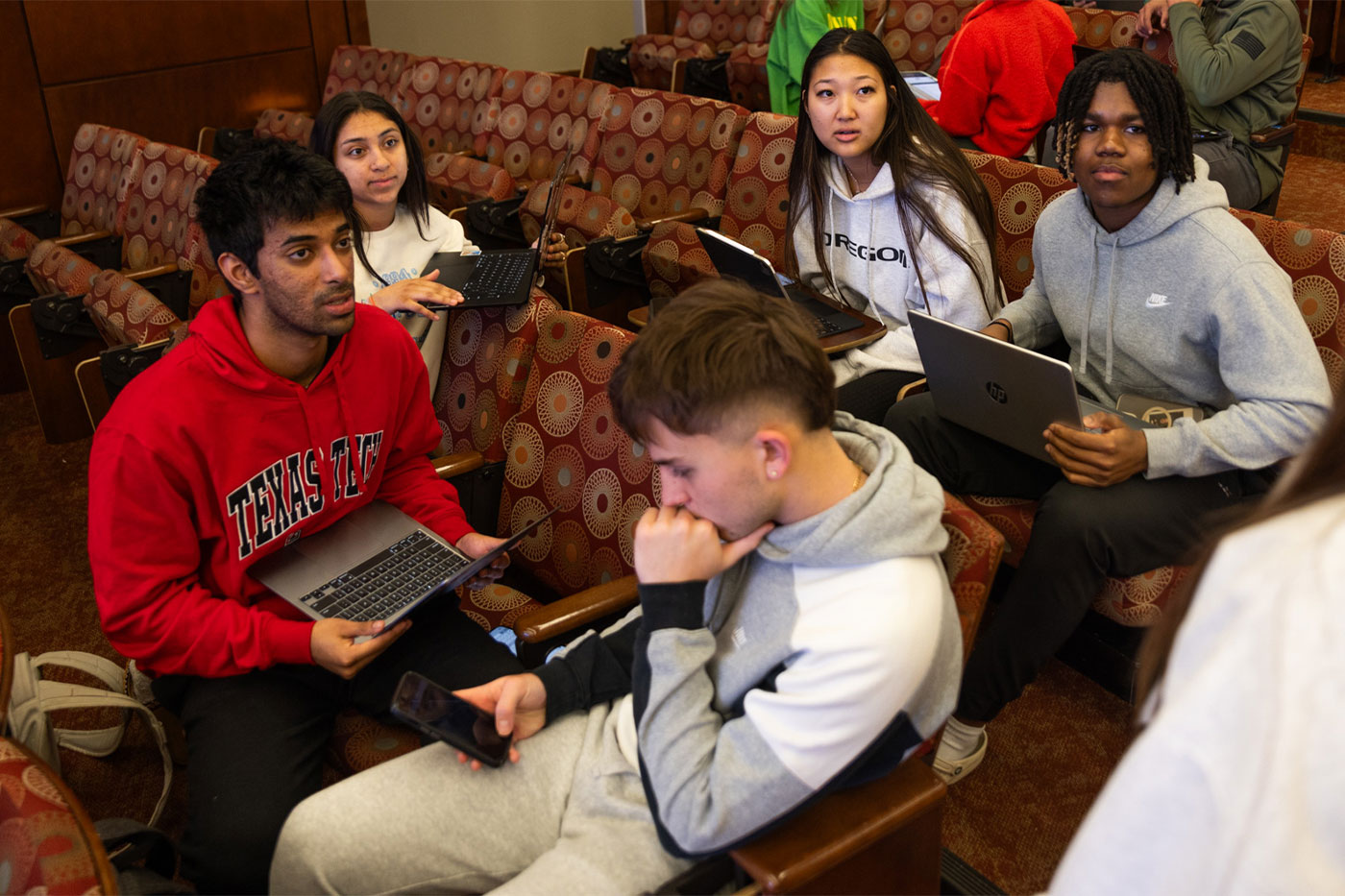
Between the social and networking events and students returning to BA 1301 as LAs, Contreras sees FYE as a shining example of Rawls College considering student success beyond the classroom and giving students opportunities to be active within the college.
“We want to take a holistic approach to student success and make sure young business students are experts in their industries and well-rounded people,” Conteras says.
Viewing student success holistically is something Lauderdale prioritizes with AISS, and it is a core motivator for resources like the Raider Success Hub and Student Success Specialists.
Lauderdale is pleased to see Rawls College adopting a similar approach.
“Student success isn't just about grades or social involvement; it's about supporting the whole person,” Lauderdale said. “We know we can't do that alone. Colleges are at the heart of this work because they know their students' strengths, challenges and needs better than anyone.”
Contreras wants first-year students to know that Rawls College and Texas Tech want them to succeed.
“Regardless of if the student is a business or pre-business major or not business at all, I hope it shows them that we have this community,” she says. “I think it speaks to the broader idea that Texas Tech wants our students here.”
Caring About Future Graduates
Rawls College’s efforts to better engage with and support its students after the pandemic reached a zenith with the start of this fall semester and a new business core curriculum.
This endeavor was led by Dino Villegas, associate dean of undergraduate programs.
“It took us about two years with many people working on it,” Villegas said. “Our process followed four main phases: map, explore, design and implement. It was a truly collaborative process from start to finish.”
Carnes says the business core curriculum had not been revamped in about 20 years. Courses, topics and issues were addressed and modified piece by piece, but there was not a unified direction.
“Students are about to spend a lot of time and money here,” Carnes says. “Are we doing what we say we’re going to do? Are we adequately preparing them for a career in whatever program they choose? The amount of data that was reviewed and interpreted was pretty remarkable.”
The college received input from a variety of stakeholders, including faculty, staff and industry leaders. This provided some insight into industry demands and the need for a stronger, more intentional interdisciplinary approach.
The Rawls Foundations became the framework of this new core curriculum and a promise to students of what to expect. The core curriculum will help ensure students are business-minded, human-centric, data-driven and tech-savvy to future-proof them for the ever-evolving business world.
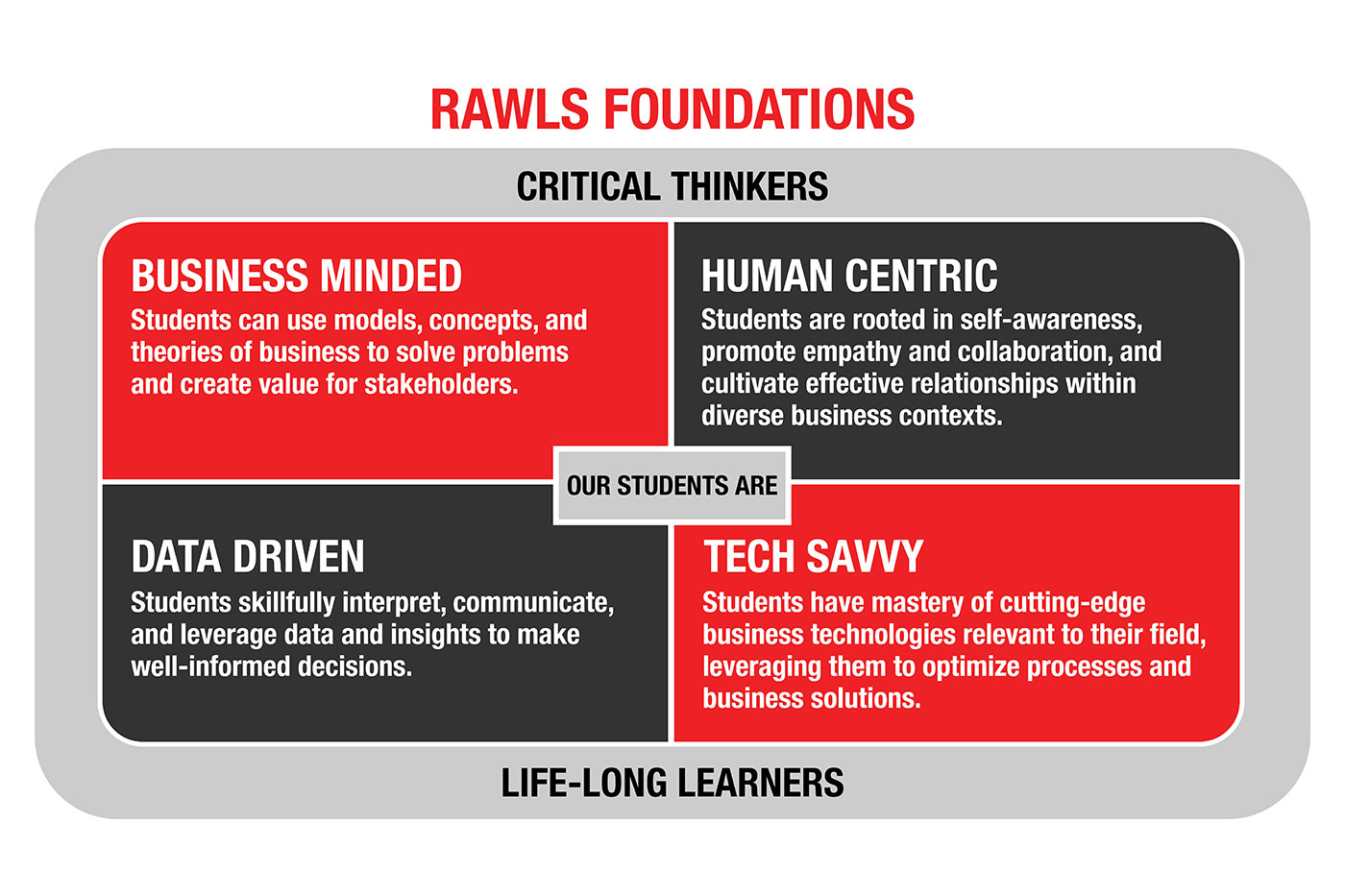
“I’m excited the student competencies provide the basis for the curriculum redesign and that, as a college, we can describe the goals of our business core — faculty and students both know why we are doing what we are doing in the classroom,” Williams said.
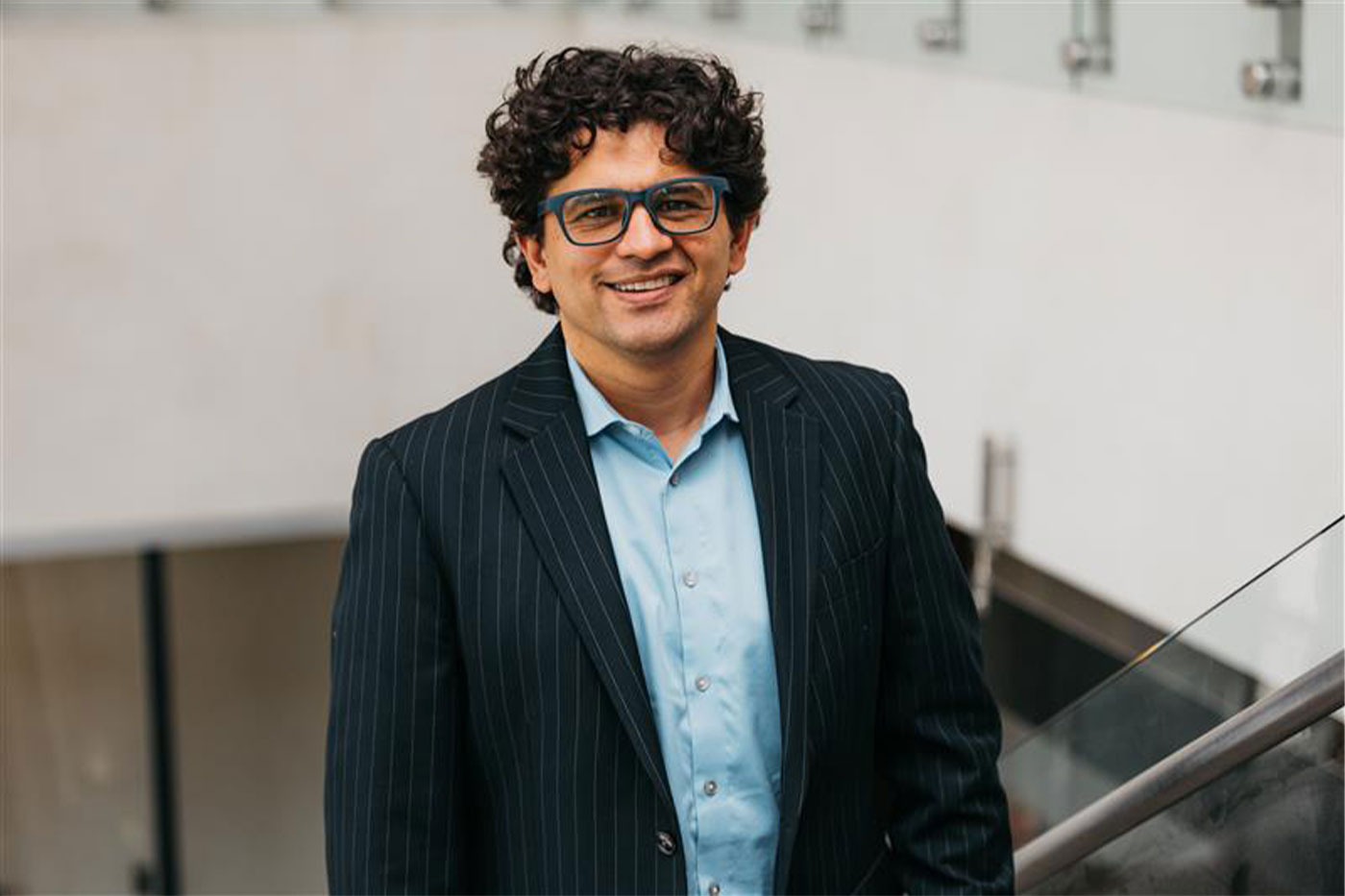
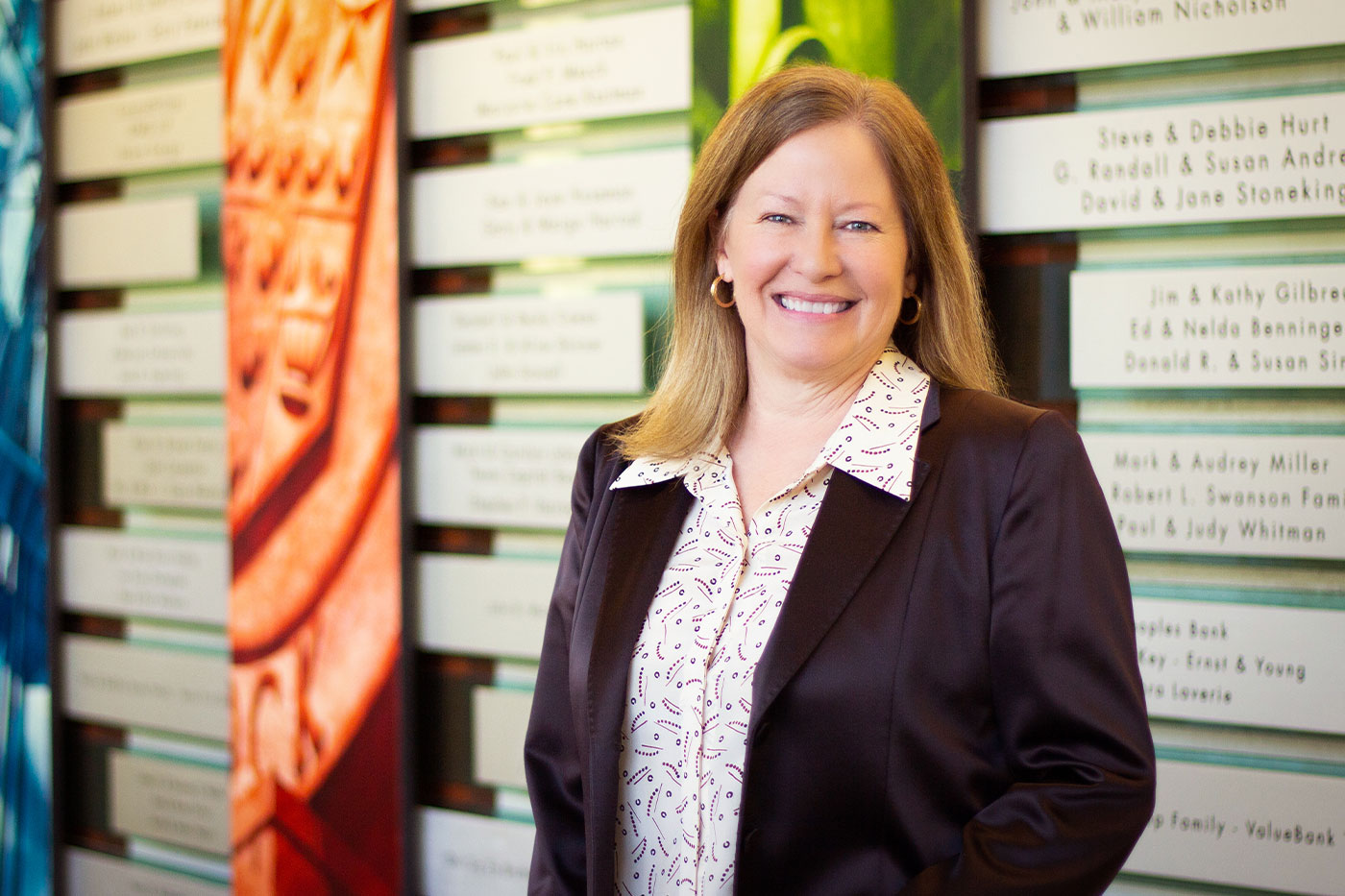
Contreras worked on the student side, inviting them to honest conversations about their expectations and where the business core curriculum was meeting them or falling short.
“Students really enjoyed being a part of that conversation,” she says. “They came with all kinds of suggestions and different comments about this core curriculum. The students felt like their voice was being heard.”
Building on the overwhelmingly positive feedback about FYE, experiential learning became the heart of this new core curriculum.
“We know students learn best when they learn from others and when they are faced with problems in real-world settings,” Villegas said. “By embracing this approach, students can truly enhance their ability to transfer the skills they acquire.”
Students were looking for more opportunities to not only be engaged with the college but also more opportunities to prepare for their careers.
The business core curriculum includes a new industry-engaged practical learning requirement (IEPLR). Rawls College students will have a meaningful applied experience before graduating to ensure they are confident and ready to enter their chosen career path.
The most common IEPLR would be an internship; however, not every student completes an internship. Perhaps a student will go work for their family’s business or start one of their own after graduating. Maybe a student’s plan is to earn a doctorate, so an internship may not make sense for their academic career goals. For these students, experiences like industry-related projects or applied experiences would meet the new requirement.
The real excitement surrounding the new core curriculum is the opportunity for Rawls College students to connect more with the college and develop a stronger sense of belonging.
“We believe students stay when they feel connected, challenged and see the value in what they’re learning,” Villegas said. “This new business core curriculum does all three. We’re not just helping students succeed, but we’re helping them see why it matters.”
Caring About Texas Tech Students
When Carnes and Contreras are asked what motivates them to do their work, they respond nearly in unison with, “Because we care.”
Carnes adds that to genuinely care about the student is to care about them as an individual. She does not see this as something that can be turned on or off depending on the student’s enrollment status. For them, it has to apply just as much to students who transfer away from Rawls College or are not enrolled in the college as it does to current Rawls College students.
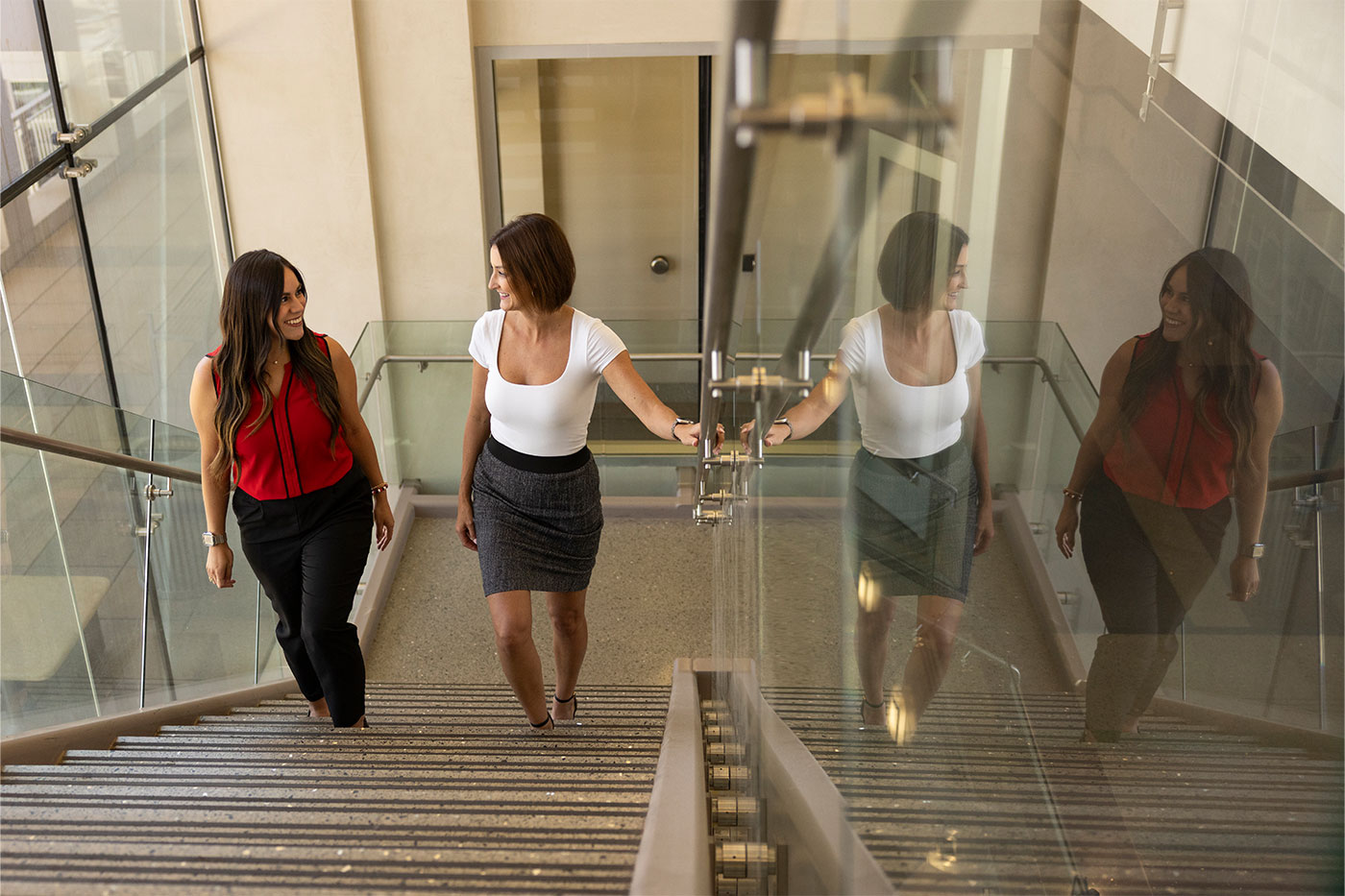
It is less about the college’s retention numbers and more that the student manages to complete a degree at Texas Tech.
“When students are sitting in front of you, telling you things that they’re struggling with and they need help with, that’s motivation enough,” says Carnes about navigating difficult conversations with students. “It’s a lot of extra work, but what’s the alternative? They quit. That’s not an option.”
In those challenging times, Carnes uncovers avenues for the student to pursue while staying enrolled at Texas Tech. She looks for industry-adjacent programs or facilitates meetings with other colleges’ academic advisors.
For example, a student who was majoring in marketing could look at transferring to advertising or communication studies with the hope that most of their time or completed work was not wasted.
From Contreras’s perspective, initiatives like First-Year Experience and the new core curriculum are vital in helping students quickly understand if a business major is right for them.
“The sooner we can expose students to as much as possible, the sooner they can figure out their pathway,” Contreras says. “Having them come to events, they might discover that they’d prefer a different major, and that’s completely OK. It’s better they figure that out as soon as possible.”
She also says she extends that level of care about prospective Rawls College students not yet enrolled in the college or at Texas Tech.
“Some students might go to community college first, and they’ll stay in contact with me, so every semester they can plan their courses so they align with the college,” Conteras says. “So, when the time comes, eventually it’s a seamless transfer transition.”
There is also hope to have Rawls College events for students working with eXplore Advising. These students are trying to discover their perfect major. The Rawls Experience Hub works with eXplore Advising to have up-to-date materials and correct terminology for talking about Rawls College majors with students, but Carnes and Contreras want to do more to help this student population know the college cares.
“It’s not just work for me,” Contreras says. “I enjoy being here. I want to be here. I want the students to feel like the college cares, and that means we care about them.”
All this caring comes back to the lists of retention and enrollment rates adorning Carnes’s office whiteboard. Each time she enters her office, she takes a quick glance at the numbers. They cheer her on, telling her the efforts matter — that these students who stay at Rawls College and at Texas Tech feel cared for.
“We develop these close relationships with these students and their families,” Carnes said. “When you think about the amount of time and money being invested in college, caring is the only way to do this work to make sure we are providing the right resources and support to make this all worth it."

